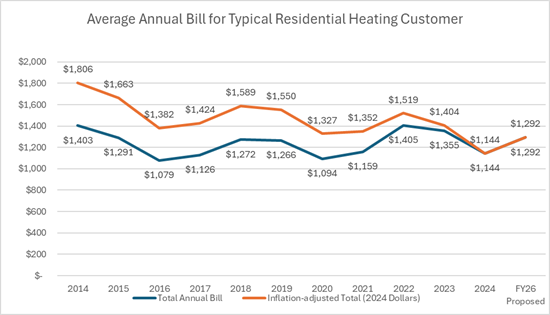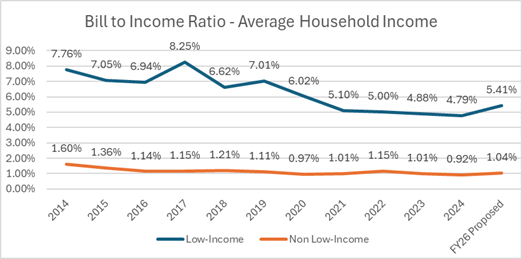PGW Files Base Rate Request to Boost Safety and Conservation and Stabilize Bills for Customers
Posted on: Feb 27, 2025The rate request will address the energy burden of those vulnerable to poverty, further safety investments, and meet the City’s carbon reduction goals
(Philadelphia, Pa – February 27, 2025) – Philadelphia Gas Works (PGW) announced today that it has filed a base rate case with the Pennsylvania Public Utility Commission (PUC). PGW has not filed for a rate adjustment in two years. The current filing requests permission to increase rates by $105 million annually to build upon the company’s effectiveness in delivering safe, reliable, sustainable natural gas service; and introduces new, innovative programs to encourage energy efficiency and to support those vulnerable to poverty in a meaningful way.
In PGW's last rate case in 2023, the PUC approved $468 million in revenue. For 2026, PGW is asking for $523 million in revenue; that $55 million difference compared to 2023 is to cover the rising costs of inflation, wage and health insurance increases and capital improvements over the last two years – which results in a $105 million base rate increase for customers.
While the cost of delivering service to 500,000 customers has gone up in the near term; the low price of natural gas and PGW’s targeted energy conservation efforts have ushered in significant cost savings for PGW customers over the last ten years.
PGW is the largest municipally owned gas utility in the country serving the highest proportion of Pennsylvania customers whose incomes are below the federal poverty threshold, this current rate proposal seeks to continue supporting the conservation actions of its half a million customers and offering newer pathways to billing stability, enhanced services, and potentially fewer rate increases moving forward. Highlights of the rate filing proposal include:
- A new low-income health and safety program offering contractors $3,000 per project on the installation of health and safety measures within a home.
- New home energy assessments and energy efficiency measures at no cost to residential customers earning up to 250% of the Federal Poverty Level (FPL).
- A new low-income PGW Repair and Renew Program that provides free repairs of hazards on customers’ gas equipment.
- Better alignment of costs for suppliers.
- Completion of system-wide safety enhancements that impact every PGW customer’s home.
Unlike investor-owned utilities, PGW does not make a profit. The company has no shareholders and there is not a rate of return included in PGW’s rates. In preparation for its filing, the company conducted an affordability analysis to assess the extent to which energy bills may pose a challenge for some customers. Some of the conclusions drawn from the analysis by PGW are:
- The annual bill for a typical PGW heating customer has decreased $259, or 18.5% over the last 10 years. Adjusted for inflation, this represents a $662 or 36.7% decrease over the same time period.
- With the proposed rates, this still represents a 7.9% decrease from 2014 that is a 28.5% decrease when adjusted for inflation.
- The average bill-to-income (BTI) ratio for the average PGW customer has decreased from 2.08% to 1.10%, with it being 1.24% under proposed rates.

“PGW’s base rate request is intended to protect the safety and well-being of our customers, their wallets, and Philadelphia’s quality of life. PGW does not make a profit as a city-owned utility. Every dollar collected is directly allocated to ensure the safe and reliable delivery of low-cost energy service to our customers – throughout every ZIP code in Philadelphia,” said Seth Shapiro, PGW’s President & CEO.
“The reality for customers today is that natural gas remains the most affordable energy option available on the market for Philadelphia’s residential families to heat their homes, do their laundry, and feed their families. We appreciate our customers’ trust in PGW to work responsibly on their behalf in our latest rate filing request. We care deeply about protecting our customer’s interests.”
If the company’s entire request is approved, the bill for a residential customer using 61 thousand cubic feet (Mcf) of natural gas per year would increase from $92.60 to $104.61 per month, or by 13%.
The trends of PGW’s bill to income (BTI) have steadily decreased over time, with proposed rates still showing lower BTI ratios for both low-income and non-low-income customers (shown below).

PGW’s natural gas rates are made up of two main components: a delivery charge (or base rate) and a commodity charge (gas cost). The base rate reflects the cost of delivering natural gas to the customer’s residence, distribution system maintenance and customer billing costs. The gas cost is what PGW pays for natural gas and is passed on to the customer without markup.
PGW is ranked amongst the best in the industry in helping its customers lower the costs of their energy bills, according to JD Power *. And natural gas remains the most affordable way to heat a home compared to other sources like electric or home heating oil.
In recent years, PGW has launched several initiatives to do more with less, carefully control PGW’s expenses, and manage the costs of rate increases, including:
- PGW applied for and was awarded a total of $125 million Natural Gas Distribution Infrastructure Safety and Modernization grants from the U.S. Department of Transportation’s (DOT) Pipeline and Hazardous Materials Safety Administration (PHMSA). The project will result in the replacement of 66 miles of cast iron main in historically disadvantaged Philadelphia neighborhoods, and the creation of 120 new skilled jobs, and reduce 412 metric tons of methane emissions.
- PGW launched the free MyPGW mobile app. Customers can now manage their My Account, monitor usage, and make payments through the app.
- PGW has led in reducing emissions for a cleaner, greener future. In 2024, PGW eliminated 7,581 metric tons of carbon dioxide equivalent emissions. 4.5 metric tons were saved by adding electric vehicles to our fleet through a Pennsylvania Department of Environmental Protection grant. And customers saved 3,480 metric tons through PGW’s energy-saving grants, rebates, and educational programs.
- PGW enhanced PGWorks.com to allow customers to access instant language translation in 50+ languages and select ADA options. These upgrades are available on desktop and mobile/smart devices.
- In 2023, PGW consolidated eight of its operational buildings into its North Operations Center, reducing PGW’s carbon emissions from those retiring facilities by 50%. Also, the consolidation will save PGW $100 million over 5 years.
- PGW established the online PGW Marketplace, where customers can receive significant EnergySense discounts on smart thermostats that regulate energy usage and help lower monthly energy bills.
- PGW has implemented a Hardship Fund Pilot program aimed at customers who are Asset Limited, Income Constrained, Employed (ALICE) at 151%-250% FPL. The Pilot program provides a one-time grant of up to $750 for customers who are recertified for CRP but were ineligible due to being above 150% of the FPL but less than 250% or who have a Protection from Abuse Order and are in this income group. This is aimed to provide support for the “benefits cliff” that many lower-income customers experience.
- PGW has continued offering a variety of energy efficiency and demand-side management programs to customers including:
- EnergySense Kits (ESK) program that provides customers with a free energy efficiency kit.
- Small Business Assessment (SBA) program which provides free walkthrough energy assessments that recommend energy efficiency upgrades, to encourage small businesses to take advantage of prescriptive rebate programs.
- A pilot program offering rebates for variable refrigerant flow (VF) natural gas heat pumps as part of the Commercial Equipment Rebates program.
- Additional funding to continue providing free smart thermostats to low-income customers as part of the Low-Income Smart Thermostat (LIST) program.
For questions, individuals and entities can contact the PUC at 1-800-692-7380 and leave their name and address to be notified of any public input hearings that may be scheduled related to this case.
*Source: 2024 Gas Utility Residential Customer Satisfaction Study
For Media help call our media hotline - Phone: (267) 249-7542

